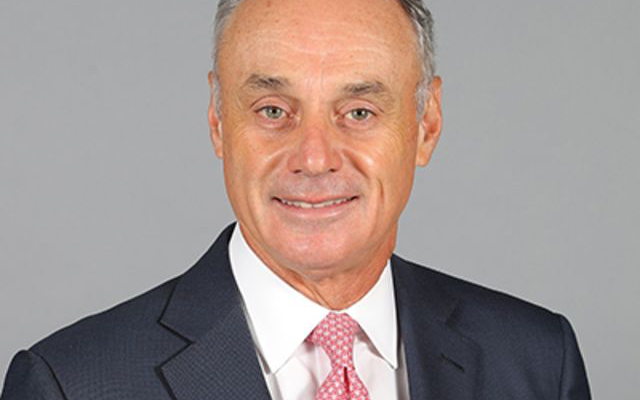MLB Sued Over All-Star Game
Small business group seeks $100 million for local businesses, $1 billion for “cruelty and hostility,” and return of the all-star game to Cobb County.
Dave Schechter is a veteran journalist whose career includes writing and producing reports from Israel and elsewhere in the Middle East.
A small business advocacy group has sued Major League Baseball for removing its all-star game from Cobb County in response to Georgia’s controversial new voting law. In addition to seeking $100 million on behalf of local and state businesses and $1 billion in punitive damages, the suit filed by the Job Creators Network asks that MLB “immediately transfer the 2021 All-Star Game back to Truist Park with all pre-game events.”
The suit, filed Tuesday in the United States District Court for the Southern District of New York, named as defendants: MLB Commissioner Robert M. Manfred Jr.; Tony Clark, executive director of the Major League Baseball Players Association, and 50 “John Does.” The latter are “businesses, corporations and individuals that conspired with Defendants to violate [federal law] and participated in committing the other tortious claims . . . However, at present the identities of these persons are unknown.”

An initial hearing in the case is scheduled for June 10 in the New York federal court.
As of this writing, neither MLB nor MLBPA has responded to the suit.
Job Creators Network was founded in 2011 by Home Depot co-founder Bernie Marcus. JCN’s website calls it “a nonpartisan organization whose mission is to educate employees of Main Street America, so we can protect the 85 million people who depend on the success of small businesses.”

Multiple lawsuits already have been filed in federal courts in Georgia against the voting law, which critics have labeled “voter suppression,” alleging that the measure violates the Fourteenth Amendment of the Constitution and the Voting Rights Act.
As with The Coca-Cola Company and Delta Air Lines, both of which issued statements critical of the Georgia law, MLB became part of a larger debate over the role of corporations engaging in political and social issues.
MLB announced April 2 that the all-star game would not be played at Truist Field. Four days later, MLB announced that the game would be played July 13 in Denver, at Coors Field, the home of the Colorado Rockies.

According to the suit, Cobb County budgeted $2 million “to meet the expected influx of tourists and fans for the big event. Businesses in the Atlanta metro region stood to earn $100 million. Multiple municipalities were counting on millions more in tax revenues … The damages resulting from the cancellation of the All-Star Game in Atlanta are staggering. More than 8,000 hotel reservations were canceled; revenues from ticket sales and stadium food by the more than 41,000 expected to attend the events at Truist Park were lost.”
Host cities have reaped amounts ranging from $37 million to $190 million in the past decade, the suit states.
“Defendants took this all away in the blink of an eye,” after Gov. Brian Kemp signed the Election Integrity Act on March 26, the suit states. “The law intended to strengthen the integrity of mail-in ballots and added other measures to Georgia’s voting laws. The Act had nothing to do with baseball. It had nothing to do with the All-Star Game. It had nothing to do with the honest, hard-working men and women of Georgia who relied on MLB’s promise to hold the All-Star Game at Truist Park.”
The defendants “purport to have perceived the new law as an affront to voters and decided to protest this new law, but not through a legal challenge or through petitioning the legislature or governor. Instead, they decided to punish the people and small businesses of Atlanta purposefully and maliciously. In remarkably candid and unequivocal declarations, MLB stated that the new law discriminated against voters, and as a result the All-Star Game must be taken away from Atlanta,” the suit alleges.
It further states that this “purposeful and outrageous conduct” violated a federal statute that protects against being deprived “of any rights, privileges, or immunities secured by the Constitution and laws” or depriving “any person or class of persons of the equal protection of the laws.”
The $1 billion in punitive damages are sought because “there is no question that Defendants, through unprecedented cruelty and hostility, intended to hurt and damage Plaintiff.”
In addition to the loss of anticipated revenues by small businesses, JCN says removal of the all-star game caused direct damage, requiring it to spend $1.6 million to support its metro Atlanta members, as well as leasing signs in New York’s Times Square and advertising in The New York Times.
“Georgia Governor Kemp called losing the event ‘the direct result of repeated lies from Joe Biden and Stacey Abrams about a bill that expands access to the ballot box and ensures the integrity of our elections.’ The lies included claims of voter suppression and not allowing voters water while they wait on line to vote,” the suit states.
Senate Bill 202 was passed in the wake of elections in which Democrat Joe Biden defeated incumbent Republican President Donald Trump in Georgia, and Senate runoffs in which Democrats Jon Ossoff and Rev. Raphael Warnock unseated incumbent Republicans. Despite claims of fraud by Trump and his supporters, the state audited, recounted by machine, and recounted by hand the presidential vote. Biden’s victory by about 12,000 votes was verified each time. Secretary of State Brad Raffensperger, a Republican, has said that Georgia experienced “safe, secure, honest elections.”
- Dave Schechter
- Sports
- Local
- Atlanta Braves
- Major League Baseball
- Cobb County
- Truist Park
- Job Creators Network
- MLB
- Robert M. Manfred Jr.
- Tony Clark
- Home Depot
- Bernie Marcus
- Coca-Cola
- Delta Airlines
- Coors Field
- Colorado Rockies
- All Star Game
- Atlanta
- Gov. Brian Kemp
- Election Integrity Act
- Voting Laws
- President Donald Trump
- President Joe Biden
- Jon Ossoff
- Rev. Raphael Warnock
- Brad Raffensperger




comments